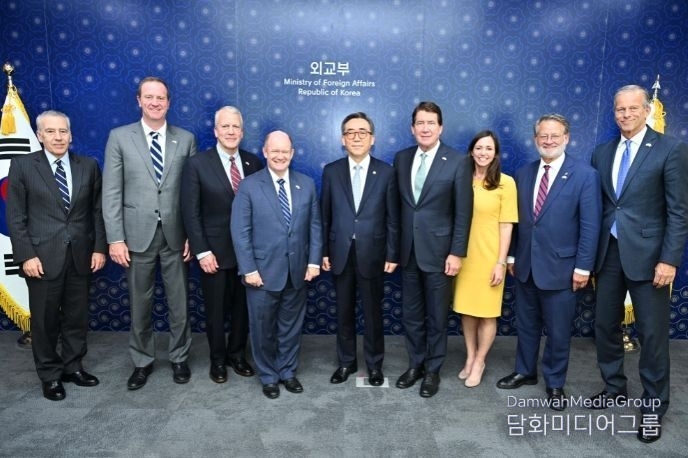By UN Journal Kayla Lee
Foreign Minister Cho Tae-yul met with a bipartisan delegation of seven U.S. Senators, including Senators Bill Hagerty and Chris Coons, to exchange views on issues of mutual interest, including U.S.-ROK relations, Korean Peninsula issues, and regional and global cooperation on Sept. 3.
Minister Cho welcomed the group of senators, who are among his closest allies, and expressed his appreciation for their efforts to build bipartisan support for the ROK-U.S. alliance and U.S.-Japan-Korea cooperation in the U.S. Congress.

He also noted that the U.S.-ROK alliance is stronger than ever and has expanded to include not only security but also economic security, high technology, and artificial intelligence, which he attributed to the bipartisan support of the U.S. Congress.
Noting that trade and investment between the U.S. and South Korea are developing in ways that benefit both peoples, Cho called for continued mutually beneficial cooperation as the two countries continue to be top economic partners, and called on the U.S. Congress to continue to support the smooth operation of Korean companies in the U.S.
In addition, Cho explained that South Korea, as a global pivotal country, has made many roles and contributions in the fields of international values, norms, and development, and called for expanded cooperation between South Korea and the United States in the international arena.
The U.S. Senators all agreed that the U.S.-ROK alliance and U.S.-Japan-Korea cooperation have made unprecedented progress since the inauguration of President Yoon Suk-yeol, emphasizing that support for the alliance is bipartisan and strong, regardless of domestic and international changes.
In this regard, Hagerty noted that the U.S. Republican Party has a clear position on pursuing peace through strength, strengthening the U.S.-ROK alliance and trilateral cooperation, and remains committed to the principle of denuclearizing North Korea.
They said that South Korea is a steadfast ally of the United States and a model of a liberal democracy that makes many contributions in the international community, and they look forward to further expanding cooperation in areas such as security and economy, as well as nuclear energy and defense.
They emphasized the importance of cooperation and coordination among the three countries in the private sector, as demonstrated by the 'Korea-US-Japan Economic Dialogue,' and look forward to further expansion of economic, military, and diplomatic cooperation in a virtuous cycle.




